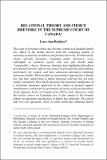| dc.contributor.author | Buckley, Lucy-Ann | |
| dc.date.accessioned | 2015-12-01T11:39:13Z | |
| dc.date.available | 2015-12-01T11:39:13Z | |
| dc.date.issued | 2015 | |
| dc.identifier.citation | Buckley, L.A. (2015) 'Relational theory and choice rhetoric in the Supreme Court of Canada'. Canadian Journal of Family Law, 29 (2):251-308. | en_IE |
| dc.identifier.uri | http://hdl.handle.net/10379/5356 | |
| dc.description | Journal article | en_IE |
| dc.description.abstract | The issue of personal choice has become central to Canadian family law. Much of the debate derives from the competing models of autonomy posited by neoliberal and feminist theorists. Neoliberalism, which currently dominates Canadian public discourse, views individuals as atomistic agents who can and should make responsible choices. However, feminists have highlighted the effects of structural barriers and social context on personal decision-making, particularly for women, and have advanced alternative relational autonomy models. These models are particularly appropriate to family law, but their application to family financial ordering has not been widely considered. This article considers the practical significance of a relational autonomy approach in the context of spousal support (maintenance) and property agreements, focusing on the jurisprudence of the Supreme Court of Canada from 1987 to date. However, while the article centers on Canadian law, it also speaks to the broader debate on autonomy and fairness in family law generally. The article asks two core questions. First, to what extent has relational theory informed the Court s decisions on spousal support and marital property agreements? Second, do or would relational understandings make a practical difference in spousal support and marital property agreement cases? The article traces the evolution of autonomy theory in the Court s decisions on marital property and spousal support agreements. It contends that the Court has gradually adopted a largely, though not consistently, relational approach; however, this approach may not always make as much practical difference as some feminists might expect. Nevertheless, the article argues that a relational approach may be vitally significant in some cases. Consequently, the article concludes that it would be regrettable if so-called choice rhetoric were to displace relational understandings in this context. | en_IE |
| dc.format | application/pdf | en_IE |
| dc.language.iso | en | en_IE |
| dc.relation.ispartof | Canadian Journal of Family Law | en |
| dc.rights | Attribution-NonCommercial-NoDerivs 3.0 Ireland | |
| dc.rights.uri | https://creativecommons.org/licenses/by-nc-nd/3.0/ie/ | |
| dc.subject | Relational autonomy | en_IE |
| dc.subject | Autonomy | en_IE |
| dc.subject | Family law | en_IE |
| dc.subject | Prenuptial agreement | en_IE |
| dc.subject | Divorce | en_IE |
| dc.subject | Separation | en_IE |
| dc.subject | Maintenance | en_IE |
| dc.subject | Spousal support | en_IE |
| dc.subject | Neoliberalism | en_IE |
| dc.subject | Feminist | en_IE |
| dc.subject | Law | en_IE |
| dc.title | Relational theory and choice rhetoric in the Supreme Court of Canada | en_IE |
| dc.type | Article | en_IE |
| dc.date.updated | 2015-11-20T15:29:23Z | |
| dc.local.publishedsource | http://faculty.law.ubc.ca/cdnjfl/Past%20Issues/29-2.html | en_IE |
| dc.description.peer-reviewed | peer-reviewed | |
| dc.contributor.funder | |~| | |
| dc.internal.rssid | 8331882 | |
| dc.local.contact | Lucy-Ann Buckley, Dept. Of Law, Tower 2, Arts/Science Building, Nui Galway. 3661 Email: lucy-ann.buckley@nuigalway.ie | |
| dc.local.copyrightchecked | Yes | |
| dc.local.version | PUBLISHED | |
| nui.item.downloads | 367 | |


